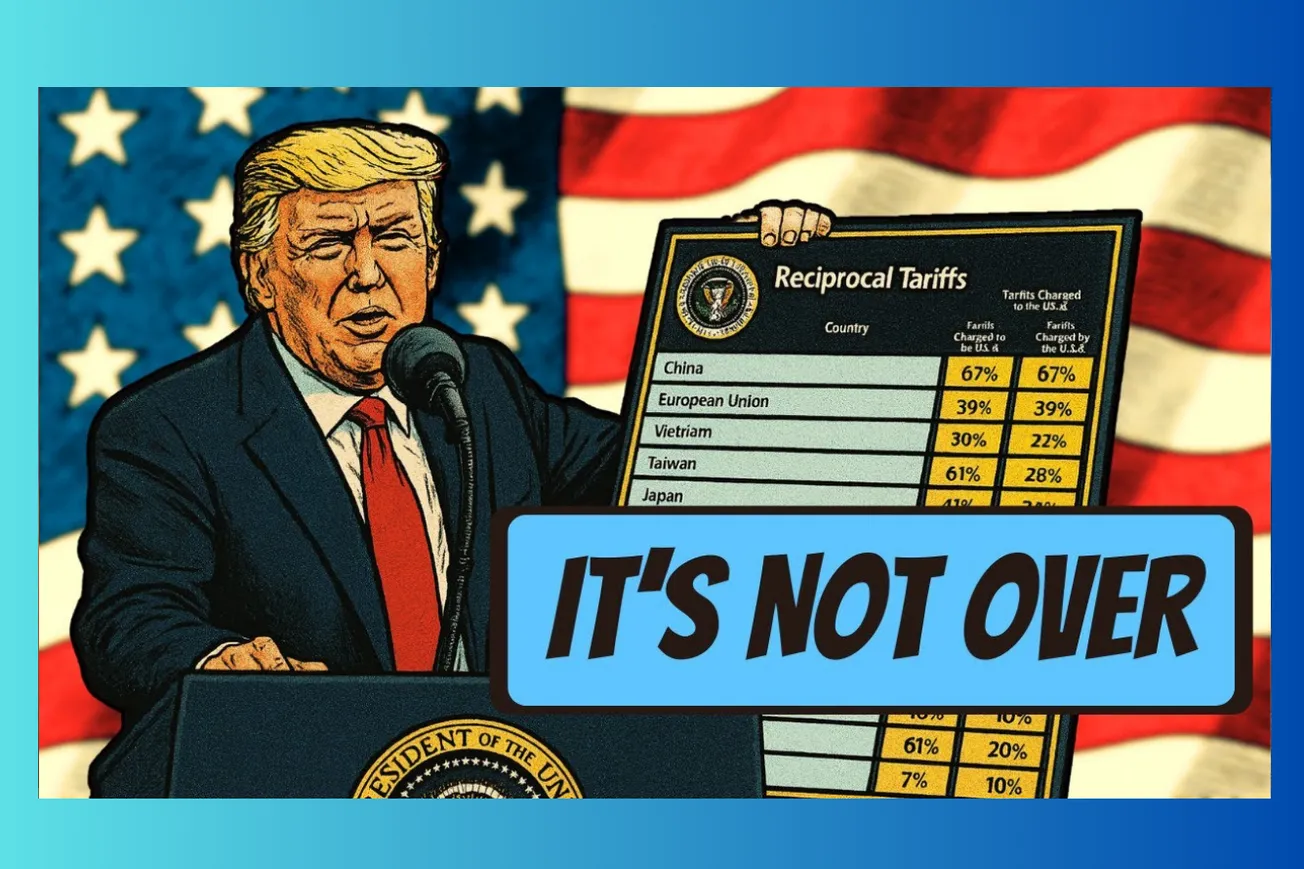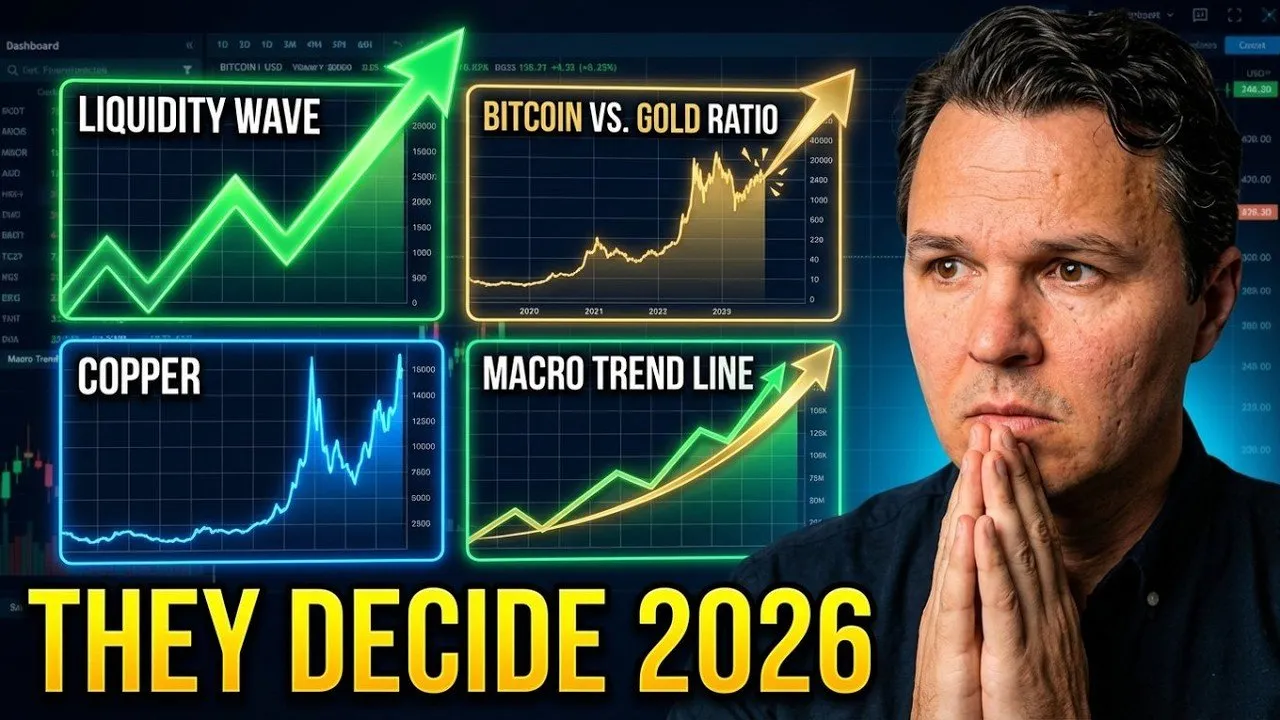Table of Contents
America, are we cooked? It's a question that would have seemed absurd just months ago, but as Trump's chaotic tariff rollout destroys decades of alliance-building while the U.S. dollar weakens instead of strengthens, former allies are openly declaring the "80-year period when the United States embraced the mantle of global economic leadership" to be over. The implications extend far beyond trade—from nuclear proliferation to the collapse of due process—suggesting America may be witnessing the end of its own global order.
Key Takeaways
- Trump's tariff formula was apparently generated by a chatbot using a simple two-variable calculation based on bilateral trade, revealing governance by algorithm rather than policy expertise
- The chaotic implementation alienated allies precisely when collective action against China was possible, shifting global dynamics from "world vs. China" to "world plus China vs. U.S."
- The U.S. dollar weakened after Liberation Day tariffs instead of strengthening, suggesting markets view American policy as emerging market-level dysfunction rather than strategic strength
- Canada's Mark Carney declared the U.S.-led global trade system "over," signaling permanent damage to the world's most integrated economic relationship
- Mass layoffs of career civil servants, including export control staff, undermine the administration's own stated goals while eroding institutional capacity
- Allies are already moving toward independent defense capabilities, including nuclear proliferation, as American security guarantees lose credibility
- Despite governance failures, America retains structural advantages in entrepreneurship, education, and private R&D that could enable recovery under competent leadership
The Chatbot Presidency: When Algorithms Replace Analysis
Here's how far American governance has fallen: the tariff formula that's reshaping global trade relationships was apparently generated by ChatGPT. When multiple government agencies spent months developing sophisticated methodologies for reciprocal tariffs—asking U.S. companies about their challenges, conducting thorough research—the final decision was made "two or three hours before the announcement" using "the most simple-minded, least rigorous approach."
The formula relied on just two variables: exports and imports with each country. Not economic complexity, not strategic importance, not alliance value—just raw bilateral trade numbers. Someone tested this by asking the free version of ChatGPT how to calculate tariffs, and it produced exactly what the administration implemented, including using internet domains rather than customs jurisdictions. Hence why the administration ended up tariffing Antarctica—because penguins have an internet domain.
This isn't just policy incompetence; it's governance by algorithm. When Commerce Secretary Howard Lutnick was forced to justify tariffing penguins, he claimed they might "get involved in rerouting trade from China." The absurdity would be comical if it weren't so revealing about how major economic decisions are now made.
The process breakdown tells the real story. Career staff across multiple agencies—USTR, Council of Economic Advisers, Commerce—developed serious policy options. Then, at the last minute, someone (probably an unpaid intern with access to ChatGPT) overwrote months of professional work with an algorithm that treats Denmark the same as China.
Liberation Day: From Isolation to Alliance
The strategic implications are catastrophic. For a brief moment in early 2024, China was genuinely isolated and worried. Then came Liberation Day—the decision to impose tariffs not just on China, but on everyone simultaneously. The global response was swift and devastating to American interests.
Mark Carney, Canada's likely next Prime Minister, captured the moment perfectly: "The global economy is fundamentally different today than it was yesterday. The system of global trade anchored on the United States that Canada has relied on since the end of the Second World War... is over."
This isn't just rhetoric. Carney announced 25% tariffs on U.S. vehicles while explicitly exempting Mexico—a direct signal that Canada will build economic relationships that bypass America. When your most integrated economic partner starts looking elsewhere after 80 years of cooperation, you've crossed a strategic red line.
The European reaction was equally telling. During the Biden administration, ASML had given software keys to the NSA, allowing U.S. intelligence to monitor China's access to advanced semiconductor equipment. After Liberation Day, the Dutch government took those keys back. America went from unprecedented access to Europe's most critical technology to being locked out entirely.
The pattern is clear: allies who were ready to coordinate pressure on China are now coordinating protection against America. Countries like India, Turkey, South Africa, Brazil, and Indonesia had been contemplating their own China tariffs due to overcapacity issues. Instead of leading a coalition, America isolated itself from potential partners.
The Dollar's Verdict: Emerging Market Economics
Perhaps the most damaging indicator is what happened to the U.S. dollar after Liberation Day. Economic theory suggests that tariffs should strengthen your currency—they make domestic investment more attractive relative to foreign alternatives, creating capital inflows that push up exchange rates.
That's exactly what happened in 2018-2019 when Trump imposed targeted tariffs. The dollar strengthened, offsetting some inflationary pressure. It's what happened earlier this year when he announced tariffs on Canada and Mexico. Basic textbook economics working as expected.
But after Liberation Day, the dollar weakened. Despite massive tariffs that theoretically should have made U.S. investment much more attractive, global capital markets delivered their verdict: American policy looked like emerging market dysfunction, not strategic strength.
The comparison to Britain's disastrous "mini-budget" in fall 2022 is instructive. When Liz Truss bypassed normal budget procedures and announced chaotic tax changes, British interest rates spiked while sterling collapsed simultaneously—a classic emerging market currency crisis pattern. Markets weren't just worried about inflation or deficits; they were pricing in a "risk premium" for having incompetent people in charge.
America may be experiencing something similar. When your trade policy is apparently generated by chatbots and your Commerce Secretary is defending tariffs on Antarctica, markets start wondering whether you're still a developed economy or just a large emerging market with nuclear weapons.
The End of Due Process
The deeper problem isn't just bad policy—it's the collapse of institutional norms that made America a reliable partner. The foundation of American strength has always been predictable due process, whether you're renewing a driver's license or negotiating a trade agreement. Everyone gets treated the same way according to established rules.
That's disappearing rapidly. Career civil servants who enforced export controls are being fired en masse while Laura Loomer reportedly influences personnel decisions. Citizens are being deported without hearings. American citizens are carrying extra documentation on cruises because they don't trust border agents to follow normal procedures.
This isn't just about fairness—it's about functionality. The Bureau of Industry and Security just lost most of its export control staff while simultaneously being asked to ramp up enforcement against China. How do you increase enforcement while firing the enforcers? It's policy incoherence disguised as government efficiency.
The arbitrariness extends to international relations. Trump negotiated USMCA five years ago, called it "the greatest trade agreement in history," then started dismantling it. Why would any country sign agreements with partners who treat treaties as temporary suggestions?
China's Strategic Patience
While America alienates allies and destroys institutional capacity, China is playing a more sophisticated game. They're not rushing to fill the global leadership vacuum because they understand that being the hegemon is often a "thankless proposition." Instead, they're letting countries conclude that retrenching to protect national interests is the fashionable thing to do.
This serves Chinese interests perfectly. If there's "no hegemon for maybe the next 10 years" and "everybody takes care of themselves," China can focus on domestic challenges like the property bubble and weak consumer spending while America destroys its own alliance system.
The Chinese approach isn't flawless—appointing an ambassador to the EU who previously questioned Baltic states' right to exist shows they can bungle diplomacy too. But their foreign policy disasters tend to be tactical mistakes rather than strategic incoherence. When China makes bad decisions, they're usually advancing some concrete objective. When America makes bad decisions, it's often unclear what the objective even is.
China also faces real structural challenges. Xi Jinping is aging with no clear succession plan, and the CCP's track record on power transitions isn't encouraging. The COVID lockdown debacle showed they can mismanage major policy tests as badly as anyone. But these are future risks, not current realities.
The Nuclear Proliferation Cascade
America's reliability crisis is already triggering dangerous responses. Baltic states are withdrawing from treaties banning landmines, signaling they can't count on American protection against Russian aggression. If small countries are reconsidering fundamental security arrangements, major allies will certainly reassess their positions.
Japan and South Korea would be "quite rational" to begin developing independent nuclear capabilities as deterrents against Chinese or Russian aggression. The nuclear debate in Europe is also accelerating—whether through expanding British and French nuclear umbrellas or Germany developing its own independent capability.
This represents a fundamental reversal of decades of nonproliferation efforts. The American security guarantee was central to preventing nuclear proliferation; if that guarantee loses credibility, the incentives flip toward independent deterrence. We could be witnessing the beginning of a nuclear cascade that makes the world far more dangerous.
The tragedy is that this was entirely avoidable. American military capabilities haven't diminished—if anything, they've improved. But capabilities without credible commitment are worthless. When allies can't trust American political leadership to honor security guarantees, they have no choice but to develop alternatives.
The Enforcement Collapse
Even the administration's stated priorities are being undermined by governance failures. BIS Under Secretary Kessler wants to ramp up export control enforcement against China—a goal most China hawks would support. But DOGE simultaneously laid off most BIS export control staff. How do you increase enforcement while firing the enforcers?
This pattern repeats across government. The administration wants to be tough on China while destroying the institutional capacity needed for effective competition. They want to rebuild American manufacturing while deporting the workers needed to staff new factories. They want reliable allies while treating alliance relationships as transactional arrangements.
The result is policy that achieves the opposite of stated objectives. Instead of constraining China, chaotic governance creates opportunities for Chinese companies to expand market share. Instead of strengthening America, institutional destruction weakens the foundations of competitive advantage.
The Enduring Strengths
Despite governance failures, America retains structural advantages that could enable recovery under competent leadership. The entrepreneurial culture, educational infrastructure, and massive private R&D spending represent genuine competitive advantages that can't be easily replicated.
Even some Trump administration policies could theoretically help if implemented competently. Reducing regulatory barriers to physical construction would boost manufacturing and infrastructure development. Tax regime stability could encourage investment. But these potential benefits require functional governance to realize.
The Biden administration struggled with permitting delays and construction bottlenecks that slowed infrastructure implementation. A competent deregulatory agenda could address real problems. But you can't implement smart deregulation when policy decisions are made by chatbots and personnel decisions are influenced by social media personalities.
The Timeline Problem
The fundamental challenge is that America's structural strengths operate on longer timescales than its governance weaknesses. Building a world-class university system takes decades. Developing a deep venture capital ecosystem requires generational continuity. Creating reliable alliance relationships demands consistent policy across multiple administrations.
But destroying these advantages can happen quickly. International relationships built over decades can be shattered in weeks. Institutional knowledge accumulated over generations can be lost through mass layoffs. Scientific research programs can be cancelled overnight.
The asymmetry is what makes the current moment so dangerous. America's competitive advantages took generations to build but can be destroyed in a single presidential term. Recovery is possible, but it requires acknowledging how much damage is being done and acting to preserve what can be saved.
Market Signals and Policy Reality
Financial markets are providing real-time feedback on American governance quality, and the signals are increasingly negative. When the dollar weakens despite massive tariffs that should theoretically strengthen it, markets are saying something important about policy credibility.
When Canadian leaders declare the U.S.-led system "over" and immediately start building alternative relationships, they're not just posturing for domestic political consumption. They're making rational decisions based on observed American behavior.
When European allies take back technology access they previously shared, they're signaling that America is no longer seen as a reliable partner for sensitive cooperation. These aren't reversible short-term reactions—they're strategic adjustments to new realities.
The Emerging Market Comparison
The most concerning aspect of current American governance is how it resembles emerging market policy-making rather than developed economy leadership. Chaotic decision-making, arbitrary rule changes, institutional destruction, and alliance abandonment are classic symptoms of countries experiencing democratic breakdown.
The difference is that emerging markets usually face external constraints—IMF conditionality, donor demands, alliance pressures—that force policy corrections. America faces no external constraints because it's still the global hegemon. This means there's no automatic mechanism to force course corrections before serious damage occurs.
The result could be a unique historical phenomenon: a global superpower experiencing emerging market-style governance dysfunction while retaining the military and economic power to impose costs on others. This combination of strength and instability makes America potentially more dangerous to global stability than it's ever been.
The Path Forward
Recovery is still possible, but it requires acknowledging the scope of damage being done. Alliance relationships that took decades to build won't automatically restore themselves when competent leadership returns. Institutional knowledge that's being destroyed through mass layoffs can't be instantly recreated.
The path forward requires protecting America's structural advantages while minimizing governance-related damage. This means preserving what institutional capacity remains, maintaining some international relationships, and avoiding irreversible strategic mistakes.
But it also requires honest assessment of how far America has fallen. When your trade policy is generated by chatbots and your closest ally declares your global system "over," you're not temporarily struggling—you're experiencing systemic breakdown.
The question isn't whether America can recover its previous position—that may no longer be possible given the damage to alliance relationships and institutional capacity. The question is whether America can stabilize at a lower level of global influence while preserving its domestic prosperity and security.
The Verdict: Cooking, Not Yet Cooked
America isn't definitively cooked, but the cooking process is well underway. The structural advantages that made America exceptional—entrepreneurial culture, educational excellence, innovative capacity, alliance relationships—remain largely intact. But they're being systematically undermined by governance failures that prioritize short-term political objectives over long-term competitive advantage.
The window for course correction is narrowing. Each day of chaotic governance creates new opportunities for competitors and new reasons for allies to hedge their bets. The damage may not be irreversible, but recovery becomes more difficult and expensive with each additional mistake.
The tragedy is that none of this was necessary. America entered 2025 with enormous competitive advantages and growing international support for collective action against China. Rather than leveraging these strengths, current leadership is destroying them through self-inflicted wounds.
Whether America ultimately gets cooked depends on how long the current governance dysfunction continues and whether the next leadership team can restore competence before permanent damage occurs. The signs aren't encouraging, but the outcome isn't predetermined.
As one former official optimistically noted: "If the U.S. was able to become friends with Vietnam by the 1990s, maybe we can be friendly with Canada again." Eventually.
The question is what will be left to rebuild when the cooking finally stops.





![This New Bitget Platform Changes the Game [Literally Gold]](/content/images/size/w1304/format/webp/2026/02/bitget-launches-universal-exchange-gold-usdt.jpg)